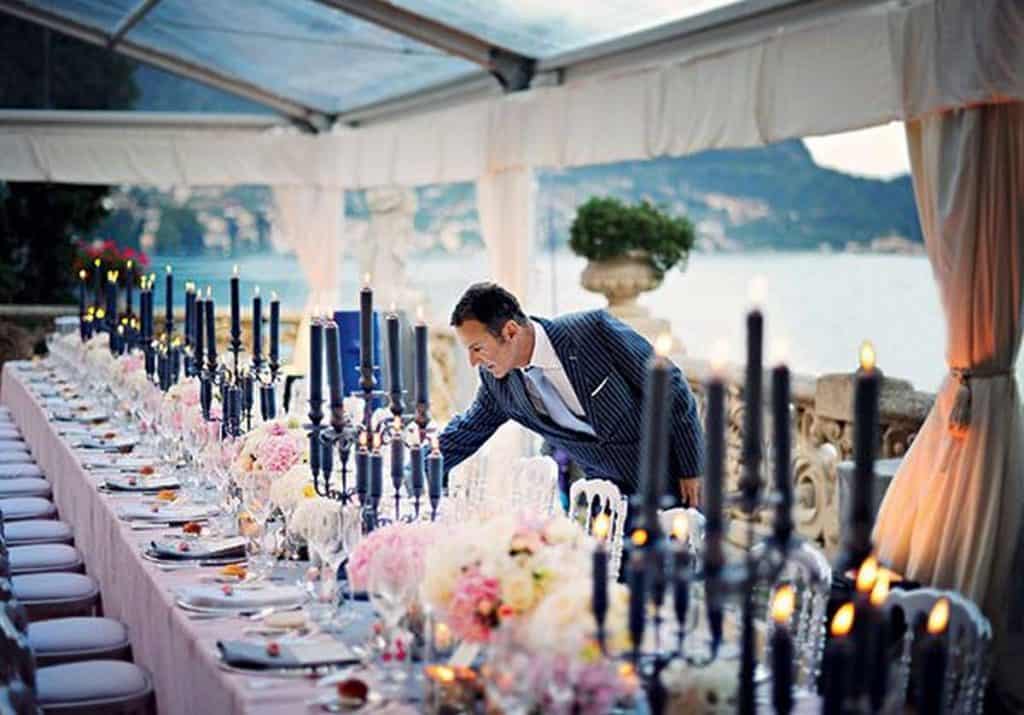Many brides-to-be hire outside help because they can't handle the pressure of organising what could be the most significant day of their lives on their own. The bride and her wedding planner decide on and coordinate all aspects of the wedding, from the location of the ceremony and reception to the gifts for guests and the clothes of the bridesmaids. The ability to carry out one's duties as a wedding planner depends on a number of qualities.
The decision to become engaged is an exciting one. In the months leading up to their wedding, most engaged couples feel nothing but joy and anticipation. We could all use some help with wedding planning, whether you've been doing it since you were a kid or have no idea where to start. The services of a professional wedding planner can greatly increase the likelihood of a stress-free wedding day.
The wedding itself, as well as the preparations leading up to it, should be treated as a joyous occasion. However, it's difficult to know where to start! Those without prior experience in event planning may feel overwhelmed by the sheer volume of information.
The majority of married couples put an excessive amount of pressure on their relationships. You desire for your wedding day to be flawless, a day that you and your guests will remember with nothing but fondness. You want the guests to be so impressed by the venue that they can't help but comment on how beautiful everything is. However, it might be difficult to plan a large-scale event while also meeting one's regular obligations. A wedding planner's assistance would be quite helpful here.
Professional wedding planners have witnessed it all when it comes to lavish nuptials. If you're having trouble determining your stationery demands, budget, or potential suppliers, they can step in and aid.
Need some help planning your wedding? Our top picks for wedding organisers are listed below.
Table of Contents
Creativity combined with patience
Planners of weddings need to be creative and patient. Without one another, they are insufficient. It takes creative thinking to accommodate the beliefs of the couple that is getting married.
Perhaps you've always imagined a wedding with classic fairground rides or a wedding with real roulette tables in a Las Vegas setting. The value of a wedding planner hinges on how well they understand the objectives of the couple.
Planners for weddings should enjoy what they do and know everything there is to know about weddings, from the engagement party through the honeymoon. Professional wedding organisers should be familiar with local deals and ways to decrease costs to better assist couples who wish to host more reasonably priced weddings. A wedding planner's familiarity with area businesses is invaluable when it comes to matching clients with those who are best suited to their needs. A professional wedding planner will be aware of the religious and cultural customs that must be followed during the ceremony.
They must be flexible and innovative so that you can choose from a wide range of options. Perhaps you're completely at a loss as to the kind of wedding you envision for yourself. Perhaps the only thing you know for sure in this world is the colour you like best. In this case, a qualified wedding planner will have an extensive list of previous events to their name. A customised mood board, tailored to your preferences, might be possible. This is a terrific resource for engaged couples looking for inspiration for their own wedding ceremonies.
Patience is another trait that will serve the wedding planner well. You want your wedding day to be perfect in every way. That's right, you heard correctly. This may force you to reconsider your goals, revise your budget, or choose an entirely new aesthetic path.
A great wedding planner is patient and kind. Ability to adapt and have compassion for your predicament is crucial.
The stress and anxiety of planning a wedding can be overwhelming. Working with a planner who shares your values and has empathy for your situation might help you have a stress-free and enjoyable engagement. As the parents of the bride and groom, it is important to find a wedding planner who will take the time to listen to and understand the parents' worries and wishes for the wedding, as they will have a significant emotional interest in the event.
Expert wedding planners have excellent interpersonal skills, which come in helpful when coordinating with so many guests. They should be friendly and conversational, as well as able to work well under pressure. Both the best and worst of people can come out at a wedding, but with the help of a wedding planner, everyone can let their guard down and have a good time. As a result of their frequent interactions with vendors and stores, wedding planners need to be people-oriented.
Finance and budget
A professional wedding planner should be able to help the couple make the most of their wedding budget. As a matter of fact, weddings can sometimes cost a pretty penny.
Most people who plan events know how to make and stick to a budget. It's important to help the newlyweds create a workable financial plan. They are so good at managing money that you won't have to skimp anywhere to have the wedding of your dreams. The reception's entertainment costs won't necessitate cutting into the budget for the wedding cake.
Find a wedding planner that can help you have the wedding of your dreams without breaking the bank.
In addition, they must offer wedding insurance from a reputable company that covers any financial losses or legal liabilities incurred as a result of wedding-related incidents. Of course, if something unforeseen does occur during the wedding, anything can happen.
Vows, speeches and acknowledgements
A wedding planner may be a valuable resource for couples since they can provide guidance on several aspects of the big day, such as the toasts, the vows, and the thank-you notes.
If the prospect of crafting your own vows or speeches makes your stomach turn, choose a wedding planner who specialises in those areas. After working at numerous weddings, they will have seen it all and will know what works and what doesn't. Being nudged in this way gradually will give you the confidence you seek.
Having good communication with the wedding planner you hire is crucial. Advice is more likely to be useful if it is given by someone who knows you and your partner as persons rather than simply clients. This will allow them to provide you with in-depth feedback while you work on your speech or vows. We appreciate any help that you can provide us.
Organisation and options
A wedding planner's organisational skills must be impeccable. Using a planner should help you relax. If you want to relax and enjoy your wedding without having to worry about the details, hire a wedding planner.
If you want your lavish nuptials to go off without a hitch, it is imperative that you hire a wedding planner who has experience organising events of significant scale. You may relax knowing that your big day is in competent hands.
A potential worry is that the wedding planner will try to take over the festivities. Any competent wedding planner worth their salt would acknowledge this as a reasonable concern and handle it as such. They want your wedding day to be perfect in every way. This is why no responsible planner will ever take charge without first discussing the matter with you.
For this reason, some event planners provide customizable packages. You can get a custom solution developed for you, or you can buy a bundle that's already been put together. Your wedding day may only require minimal guidance on the venue's style and arrangement. Or perhaps you would benefit from day-of coordination support.
Maybe you're on the lookout for more in-depth support with your wedding preparations. Thus, a planner would be responsible for organising the finances, arranging the schedule, sending out invitations, buying materials, and picking the best possible venue. Even if you're paying for comprehensive planning assistance, you should take an active role in the process.
Hiring a wedding coordinator who gives you these options is essential. Enjoyment of the encounter can be increased by locating a method that works for you.
You need someone who can multitask and keep track of all the details to be an excellent wedding planner. Successful wedding planners need to be multitaskers who can keep their cool under pressure. Since she is in charge of many weddings and a mountain of paperwork, she must be physically organised as well. Since the time span for wedding planning can range from months to weeks, a good wedding planner needs to be able to work under pressure and on deadlines.
A professional wedding planner will act as a mediator in the event of any disputes between the couple and the venue or the vendors. In addition to helping you with wedding planning, she can give you advice on how to handle any difficult family dynamics that may occur. A planner can be useful in many ways, but she is not a therapist.
Having a system in place that prioritises the most important ceremonies without neglecting the others is essential if you're arranging numerous weddings at once. Making use of a personal calendar to record all of your obligations is a good first step. Instead of using such an antiquated manner, you might use PC-based event management software.
When you save your information on the cloud, you can get to it from any device, anywhere in the world. If you find that even this is too much work, you can use your smartphone to access helpful planning tools. Many options exist, some of which are free while others require a fee. The complete app version can also have a sign-up component. If you are unable to find an event registration programme that includes this functionality, there are many possibilities for stand-alone event registration software.
Empathy and universal communication
A professional wedding planner can modify their services to meet the needs of their clients. Once upon a time, the bride and her mother would meet with the planner to discuss every last detail of the wedding. Now that same-sex civil unions are recognised by law in all fifty states, wedding planners must accommodate the wishes of a wider range of couples.
Speaking with clients and vendors will take up the bulk of your time as a Wedding Planner. Your wedding planner will serve as something of a personal assistant to you and your spouse-to-be, with whom you will spend a significant deal of time corresponding. To successfully persuade clients of your ability, describe the projects you can take on for them, and offer advice on logistical issues like budget, aesthetics, and protocol, you need to be an effective communicator.
Your client has high expectations, and you must be able to communicate with them clearly (both orally and in writing) from the get-go if you want to succeed. If you have good relationships with your suppliers, you can provide your clients high-quality goods at affordable prices. You must be able to bargain with vendors and give them specific instructions in order to have a successful wedding day.
Wedding planners should not only talk about themselves and their experience, but also ask questions and pay attention to the answers they receive. Your planner needs to take the time to get to know you on a deeper level and listen to your spoken and unsaid feelings if you want your wedding to be a reflection of who you are as a person.
Communicating effectively with guests of varying financial status, sex, and educational attainment is an essential skill for any wedding planner. A wedding planner's success depends on their ability to read the room, figure out what guests really want, and give it to them.
Business-Savvy
In addition to event organisation, a wedding planner's skillset should involve knowledge of business management. Most event coordinators work independently. In addition to wedding planning expertise, they require solid business sense. Essential business skills for a wedding planner include the ability to handle finances (i.e., charge clients fairly) and promote one's services (i.e., get new customers). Wedding planners who foresee the need for additional staff would be advised to brush up on their HR knowledge. There are various contracts that a wedding planner will need to sign on behalf of their clients, including those with the planner, the venue, and the caterer.
In the end, your wedding is not the place to show off your impressive intelligence, lavish lifestyle, or physical attractiveness. There should be a celebration when two people decide to put their individuality aside and work together to make their lives what they want them to be. If two people are committed to working together towards a common objective, they can make it a reality.
Luckily, there are plenty of excellent event organisers out there who are up to par with these requirements. Your planner is crucial to your enjoyment of the planning process. Don't make snap conclusions; instead, take the time to get to know the person. Hiring a wedding planner is a worthwhile investment.
Conclusion
Organizing what may be the most important day of their life may be overwhelming, and many brides choose to recruit assistance from the outside world to relieve some of the stress. Hiring a professional wedding planner can make it far more likely that your big day will go off without a hitch. Below are some of our favourite wedding planners. Wedding planners ought to be passionate about their work and well-versed in all things related to weddings. They need to be adaptable and creative to give you a lot of different possibilities to pick from.
A good wedding planner has enormous patience and empathy. Possessing the flexibility to adjust and the empathy to understand your current situation are essential. In order to maximise their funds, the couple should hire a competent wedding planner. They must provide valid wedding insurance from a reputed firm. Someone who knows you and your spouse as people, as opposed to just clients, is in a better position to provide you sound advice.
The ability to organise flawlessly is essential for a wedding planner. You can unwind with the help of a planner. The style and arrangement of the wedding venue may simply need minor advice. Or maybe you need help on the big day itself with coordination. It's crucial to hire a wedding planner who provides these choices.
If there are any disagreements between the couple and the venue or the vendors, the wedding planner will step in as a mediator. You might ask her for guidance on how to deal with tense situations at home. A planner is helpful in many ways, but she is not a substitute for mental health care. An important talent for any wedding planner is the ability to communicate clearly and successfully with guests of diverse socioeconomic backgrounds, sexual orientations, and levels of education. Knowing how to manage money and market one's services are two of the most important business skills for a wedding planner. To be a successful wedding planner, one must have the ability to "read the room," or the wedding guests, and anticipate their needs and desires.
Content Summary
- Hiring a wedding planner can make all the difference in the world for those hoping for a relaxed ceremony and reception.
- It would be really convenient to have the services of a wedding coordinator in this situation.
- Are you in need of any assistance in wedding preparation?
- Below are some of our favourite wedding planners.
- A trained wedding planner will be familiar with the many religious and cultural norms that must be observed.
- The ability to exercise patience is another quality that will serve the wedding planner well.
- You expect nothing less than absolute perfection on your wedding day.
- A good wedding planner has enormous patience and empathy.
- Possessing the flexibility to adjust and the empathy to understand your current situation are essential.
- Wedding planning may be extremely stressful and nerve-wracking.
- In order to have a stress-free and pleasant engagement, it can be helpful to work with a planner who shares your beliefs and has empathy for your situation.
- Spending and revenue projections
- The couple should be able to get the most out of their wedding budget with the assistance of a professional wedding planner.
- It's crucial that you assist the newlyweds in formulating a workable budget.
- You can have the wedding of your dreams without going into debt if you consult with a wedding planner.
- It is essential that you and the wedding planner you hire get along well.
- The ability to organise flawlessly is essential for a wedding planner.
- You can unwind with the help of a planner.
- Hiring a wedding planner will allow you to focus on having fun and not stressing over the little things.
- Perhaps you'd like some more in-depth assistance with your wedding planning.
- It's crucial to hire a wedding planner who provides these choices.
- If you want to be a great wedding planner, you need to be able to juggle many tasks at once and remember them all.
- If there are any disagreements between the couple and the venue or the vendors, the wedding planner will step in as a mediator.
- Keeping all of your commitments in one place by using a personal calendar is the first step.
- Cooperation and understanding among all peoples
- A skilled wedding planner will be able to tailor their offerings to the specifics of each event.
- As a Wedding Planner, you can expect to spend a lot of time in conversation with clients and suppliers.
- Having positive interactions with your suppliers is crucial to being able to offer your customers competitive pricing on high-quality products.
- A wedding planner's toolkit must to include business management expertise in addition to event planning expertise.
- They need business acumen in addition to wedding planning skills.
- In order to take pleasure in the planning process, you will need your planner.
- Do not jump to judgments; rather, take the time to get to know the person.
Frequently Asked Questions About Wedding Planner
A full wedding planner helps to plan your wedding from start to finish and is usually hired early on in the planning process—at least 10 months in advance. The average starting rate for a full-service wedding planner is about $3,000 with top-tier planners averaging $4,500 to $12,000.
When it comes to making the most of your budget, a wedding planner can actually help you save more on your bottom line. The value of hiring an experienced event planner for your wedding or special event cannot be overemphasized.
A good rule of thumb for budgeting is to only spend 15% of your total wedding fund on a wedding planner. And that's for full-service coordination. Other types of wedding planners (outlined below) will cost less.
If you're not hiring a wedding planner for your big day, you're better off getting on your vendor's schedule well ahead of your wedding day. Booking early will help ensure you get the vendors you want and reduce stress in the months and weeks leading up to your wedding once you know your vendors are locked in.
Paying your wedding vendors will largely depend on your individual contracts with each vendor. Some require the full amount upfront; some allow for monthly payments. Pay final invoices for a planner, venue, photographer/videographer, DJ/band and florist.




